How Often to Seal Granite Countertops: Unlock Their Beauty
Granite countertops are a popular choice for homeowners due to their durability, longevity, and aesthetically pleasing appearance. However, these countertops require some maintenance to keep them looking their best. One important maintenance task is sealing the granite to protect it from stains, scratches, and other forms of damage. But how often do granite countertops need to be resealed? In this article, we will explore the factors that affect how frequently you need to seal your granite countertops and provide some valuable tips for ensuring they stay in top condition.
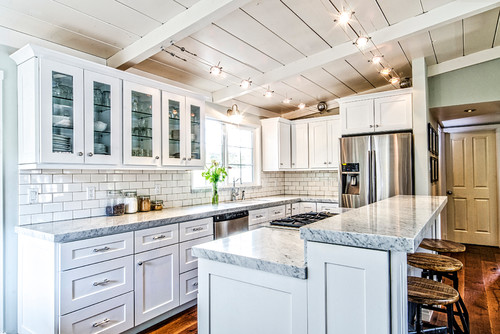
When to Reseal Your Granite Countertops
Sealing your granite countertops is essential for maintaining their beauty and durability. However, the question remains, how often do you need to seal granite countertops? While the frequency of resealing depends on factors like the type of granite and usage, here are some general guidelines to consider:
- Most granite countertops need sealing once every one to three years. However, darker granite varieties may need less frequent resealing than lighter granite countertops.
- The water test can be a helpful indicator of whether your countertop needs to be resealed. If your granite counters absorb liquids, water drops no longer bead up, or the granite appears darker after the water test, you may need to reseal.
- If your granite countertops are older or heavily used, they may need resealing sooner than newer or less frequently used countertops.
- If you notice unsightly stains, excessive moisture, or other signs of damage on your granite countertops, this may indicate that it needs resealing.
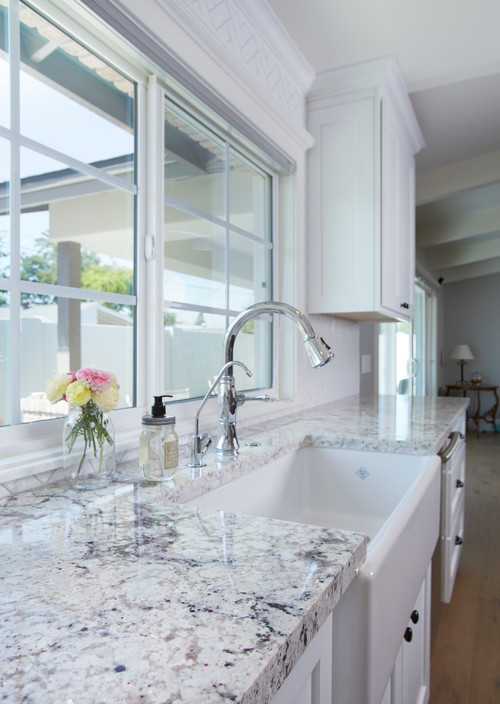
Why Reseal Granite Countertops
Granite is a popular choice for kitchen and bathroom countertops due to its durability and natural beauty. However, even though granite is heat-resistant and durable, it is a porous stone that requires sealing to protect it from stains, bacteria, and other forms of damage. Here are some reasons why resealing your granite countertops regularly is essential:
- Protection Against Stains: Sealing granite countertops provides an additional layer of protection that can repel spills before they penetrate the surface.
- Maintenance of Appearance: Over time, granite can become dull and discolored due to exposure to sunlight, heat, and other factors.
- Protection Against Damage: Sealing your granite countertops can provide a protective layer to help prevent chips, cracks, and other forms of damage.
- Longevity: While granite is a durable material, resealing your countertops regularly can extend their lifespan.
Resealing your granite counter can protect it against stains, maintain its appearance, and ensure longevity. Be sure to use a sealant compatible with your particular granite variety, follow the manufacturer’s directions for reapplication, and apply it generously to ensure a properly sealed surface.
Overall, sealing and resealing your granite countertops is an essential part of granite maintenance that can help ensure the durability and longevity of this stone surface.
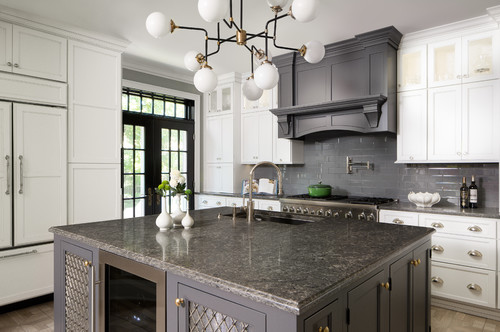
Confirm That You Have Granite Countertops
If you want to confirm whether your countertops are made of real granite, there are a few simple steps you can follow:
- Tap the Surface: One easy way to tell if your countertop is granite is to lightly tap the surface with a small hammer. Real granite should produce a solid sound when tapped. If the sound is hollow or fake, it may not be made of real granite.
- Check the Seam: Look at the seam of an existing granite countertop installed in your home. If the pattern of the granite appears almost seamless at the seam or there is no visible shift in the pattern, it could indicate that it is fake. Real granite will often have natural variations that may cause a slight shift in the pattern at the seam
- Assess the Quality: Evaluate the quality of your granite by looking for variations in color, pattern, and texture. Granite buyers should never attempt to compare pieces based on different scales. Instead, assess the quality by looking for consistent color, pattern, and texture across the entire surface.
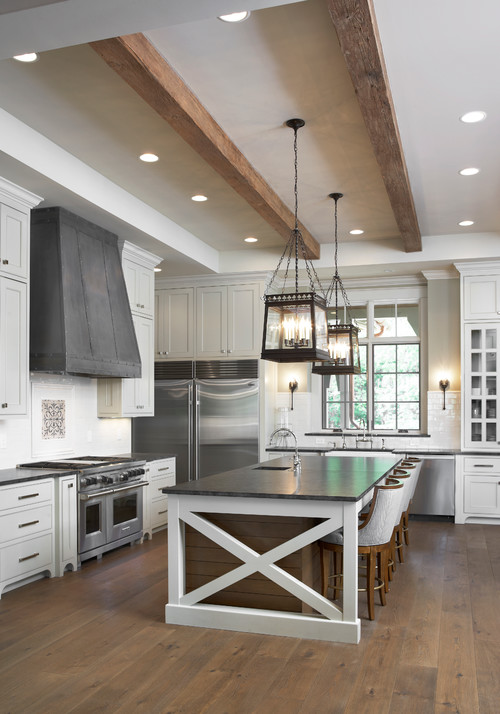
How do you know when granite needs to be sealed?
Granite is a porous natural stone that requires sealing to protect it from acidic spills, excess moisture, and unsightly stains. However, how often should you seal your granite countertops, and how do you know when the countertop needs to be sealed?
Using the Water Test to Determine If Your Granite Counters Need to Be Sealed
One simple way to determine whether it’s time to seal granite is to perform a water test. This involves placing a few drops of water on your countertop and waiting 10-15 minutes before checking the test area. If the granite surface has absorbed the water drops or has become darker, it may require sealing. If the water remains on the surface and does not penetrate the granite, it may not be time to reapply sealant.
It is essential to remember that different varieties of stone may require different approaches to sealing. Some darker granite varieties may need less frequent sealing than lighter granite countertops. Quartz countertops and other stone surfaces, including marble, may also require sealing.
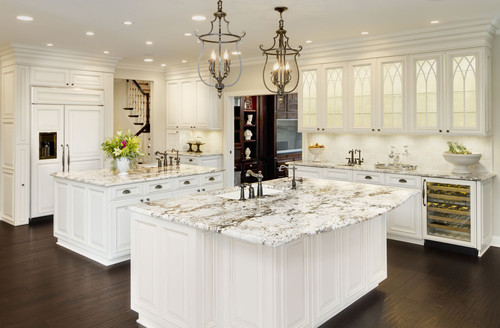
What Sealants to Use on Your Granite Countertops
Choosing the proper sealant is essential for sealing and resealing your granite countertops. Natural stone sealers are specifically designed to protect granite countertops, but there are some other considerations you should keep in mind when choosing the proper sealant for your countertop:
- Always read the manufacturer’s instructions to ensure compatibility with your particular granite variety.
- Oil-based sealants tend to be more effective and last longer than water-based sealants, but they may not be safe for all types of granite.
- For larger areas, look for long-lasting sealants that can provide extended protection against stains and other forms of damage.
- Avoid using products such as cooking oil, lemon juice, or grape juice on your granite countertops, as these acidic liquids can actually damage the surface over time.
Best Granite Sealants
Aqua Mix Sealer’s Choice Gold
Black Diamond Stonework Granite Plus
Trinova Granite Sealer and Protector
Best Granite Cleaners
Granite Gold
Weiman Disinfectant Granite Daily Clean & Shine
How to Seal the Countertop
Sealing your granite countertop is crucial to maintaining its natural beauty, helping it stay protected. Here’s a step-by-step guide on how to properly seal your granite countertop:
Read the Label on the Sealant
Read the label on the sealant carefully for instructions and ensure compatibility with your particular granite variety.
Test the Sealant
Before applying sealant to your entire countertop, test it in an inconspicuous area. This will help you determine if the sealant is a good fit for your granite variety.
Prepare the Countertop
Prepare the surface of your granite by cleaning off all dirt, grease, and other debris. A microfiber cloth or wet rag is ideal for cleaning the countertop surface before sealing.
Apply the Sealant
Use a spray bottle or roller to apply sealant evenly across the entire surface of your granite countertop. Make sure to apply a thin layer of sealant – too much will create an unsightly finish.
Apply Your Granite Sealer in a Circular Motion
Wearing rubber gloves, pour some granite sealer onto a small section of your countertop at a time and spread it evenly using a circular motion starting from one end and working towards another. Cover your entire countertop using this method. If needed, apply a second coat with a clean rag per the manufacturer’s directions. After application, leave it undisturbed for 10-15 minutes.
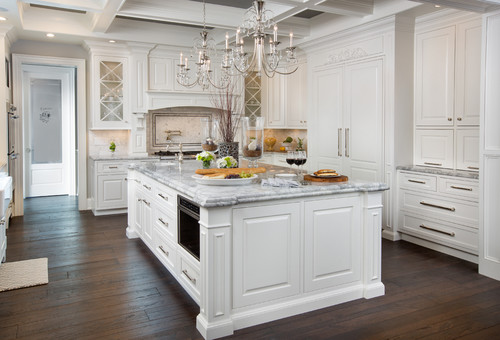
Wipe off excess and allow it to cure
Wipe off excess sealant from the entire counter using a cloth and ensure no sealer residue is left behind. Use a clean microfiber cloth or soft brush to remove any excess adhesive. If left unattended, the excess sealant may create an unsightly finish and cause discoloration. Allow your granite countertop to cure for at least 24 hours.
Let It Dry
Allow the sealant to dry completely before using your countertop. This could take anywhere from a few hours to a day, depending on the particular sealant you chose.
Wait 24 hours before exposing sealed granite surfaces to regular uses such as cooking or cleaning. This will help guarantee your countertops are completely sealed and ready for use!
Using the right sealant and techniques will help protect your kitchen investment for years
Regularly sealing your granite countertops can ensure they remain stain-free and look beautiful for years!
How often should you seal your granite countertop?
With proper care, your granite countertops should only be resealed every one or two years, depending on the sealant used and the amount of wear and tear it receives. If you notice increased stains or discoloration, applying a fresh coat of sealant as soon as possible is best.
If you have darker granite countertops, they may require resealing once a year to ensure their longevity. You can also choose quartz countertops instead of granite for a low-maintenance option that won’t require sealant.
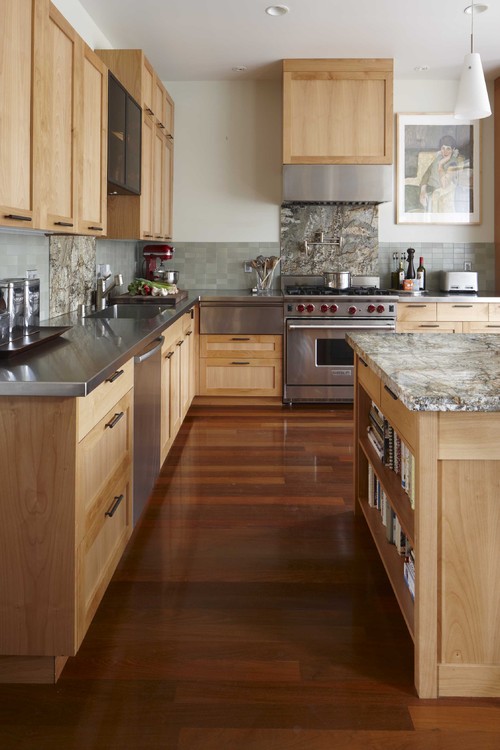
Regardless of the type of stone surface, it’s essential to invest in quality, long-lasting granite sealants and follow the instructions carefully for the best results. If you notice any unsightly stains or damage on your countertops, use a mixture of baking soda and water or a few drops of cooking oil and lemon juice to clean it off.
Finally, opt for a sealant designed for natural stones like granite for maximum protection. This should give you the best results when protecting your kitchen countertops from stains, chips, and more!
How to regularly clean your sealed granite countertop
Properly cleaning and maintaining your sealed granite countertop is essential for preserving its stylish look and keeping it free from unsightly stains. Here’s a guide on how to properly clean and care for your granite countertop:
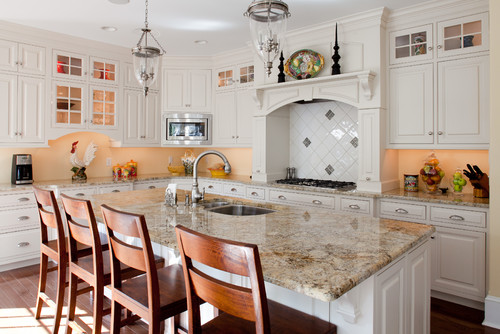
Blot Spills Immediately
To reduce the risk of discoloration or etching, blot spills such as red wine or acidic liquids immediately.
Use Warm Water and Dish Detergent
Use warm water and a few drops of dish detergent for regular cleaning in a spray bottle. Spray the surface lightly, then wipe away with soft rags, going in one direction for best results. Rinse with clean water afterward and dry using a soft rag or paper towel.
Avoid Using Cleaning Liquids
Avoid using cleaning liquids with harsh chemicals, vinegar, or lemon juice, as these products can damage your granite surfaces over time, even if they are correctly sealed.
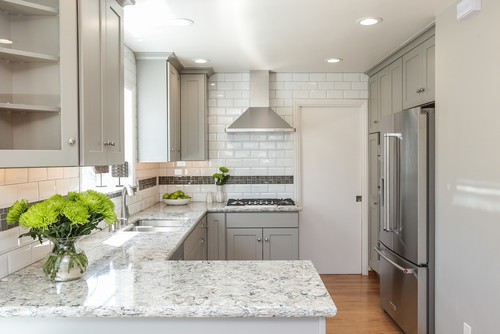
FAQs
How do you know when granite needs to be resealed?
Generally, you should reseal your granite countertops once every 1-3 years, depending on how much use they get. Perform a simple water test to check if your countertop needs to be resealed. Place a few drops of water on the surface and wait 10-15 minutes. If the water soaks in rather than being repelled by the stone, it’s time to reseal your countertop.
Can you seal your granite too often?
Yes, it is possible to over-seal your granite countertop, leading to discoloration, dullness, and other damage. Oversealing can also cause excess sealant, which will harden over time or create streaks when wiped away. For best results, only seal when needed per the manufacturer’s instructions.
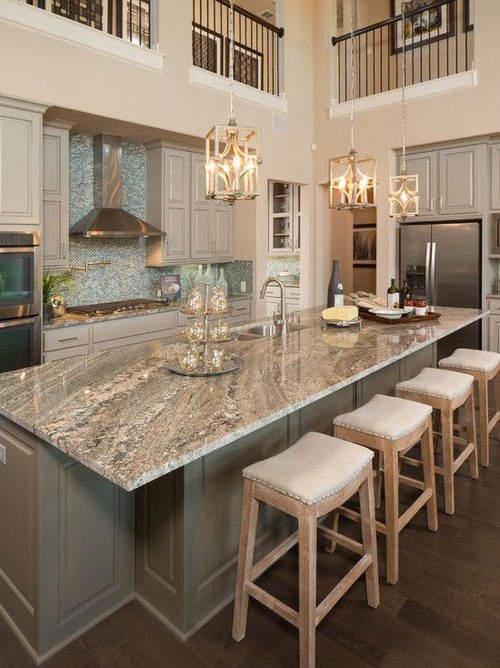
How long does sealer last on granite?
The longevity of your sealer largely depends on how much wear and tear the surface receives, including exposure to spills or acidic liquids, as this can erode or weaken the protective layer. Properly sealed granite surfaces can last up to 3 or more years without needing to be resealed; however, perform a water test every 12-24 months just to be sure!
Is it worth sealing granite?
Yes! Sealing your granite countertops is essential in preserving their look and preventing damage. The process is relatively quick, simple, and affordable, making proper sealing worthwhile.
Can you use Clorox wipes on granite?
Clorox wipes are not recommended for granite surfaces as they contain harsh chemicals that can damage the surface even when its properly sealed. It’s best to stick with warm water, mild dish soap, and a soft cloth or sponge for daily cleaning instead.
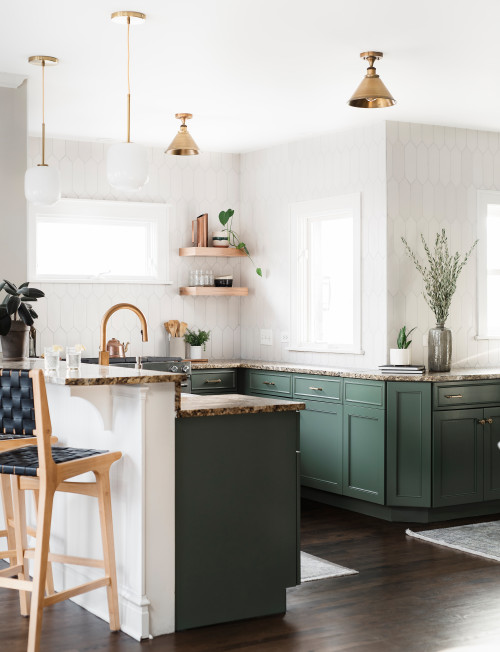
Can you put a hot pan on granite?
Yes and no. Granite is naturally heat-resistant, so hot pans can technically be placed directly onto the surface without causing damage; however, it’s essential to exercise caution as sudden temperature changes can cause cracking or other damage over time.
What not to put on granite countertops?
It’s best to avoid using anything harsh or acidic such as vinegar, lemon juice, ammonia, or bleach, on your granite countertop, as these products can weaken and damage the sealant over time leading to staining or discoloration. Additionally, acidic spills (such as lemon juice) should be removed immediately with a damp cloth to prevent permanent etching.
How do you keep granite shiny?
Regular cleaning with warm water and mild dish soap will help maintain your shiny granite countertop; additionally, you can apply spray sealants every 12-24 months, depending on usage, to help reduce dullness from wear and tear.
Is Dawn dish soap safe for granite?
Dawn dish soap is generally safe for sealed granite surfaces, but it’s important to remember that regular daily cleaning should be done with warm water and only a couple of drops of soap. Large amounts of Dawn can wear down your sealant.
Should you use Windex on granite?
Windex is not recommended for granite surfaces as it contains harsh chemicals that can damage the sealant and the stone itself. Additionally, Windex may contain ammonia which can strip the protective layer of your granite, leaving it susceptible to staining or discoloration over time. Instead, stick with warm water and mild dish soap for daily cleaning.
What is the best product to make granite shine?
A sealant is usually the best product to make granite shine because it seals the stone and helps protect it from stains and damage. If you want to add extra shine to your counters, you can use a product such as granite polish with a specialized formulation that brightens dulled stone surfaces.
How do professionals polish granite?
Polishing granite is a relatively simple process that can make a big difference in the overall look and feel of your countertop. Professionals typically use warm water, mild dish soap, or a cleaning liquid designed for natural stone surfaces. After wiping down the entire surface with a damp microfiber cloth, they will apply a thin coat of sealant while wearing rubber gloves to ensure the proper amount is applied. Once the sealant has been evenly distributed across the entire countertop, it should be left overnight before being buffed with a soft rag in circular motions until desired results are achieved.
It’s important to note that you need to seal granite countertops periodically to ensure their appearance and prevent any potential granite stains from appearing due to acidic spills or regular exposure to liquids. For best results, seal granite when it’s brand new and then reseal every 1-2 years or as needed. You can tell if you need to reseal granite if you see water is being absorbed into the stone instead of beading up or if you see visible etching on the surface.
6 comments
Comments are closed.